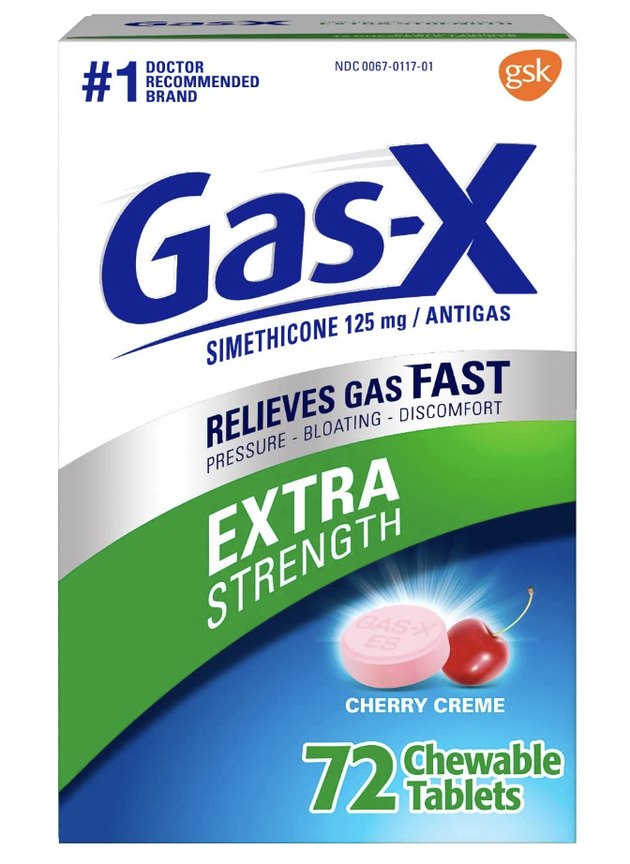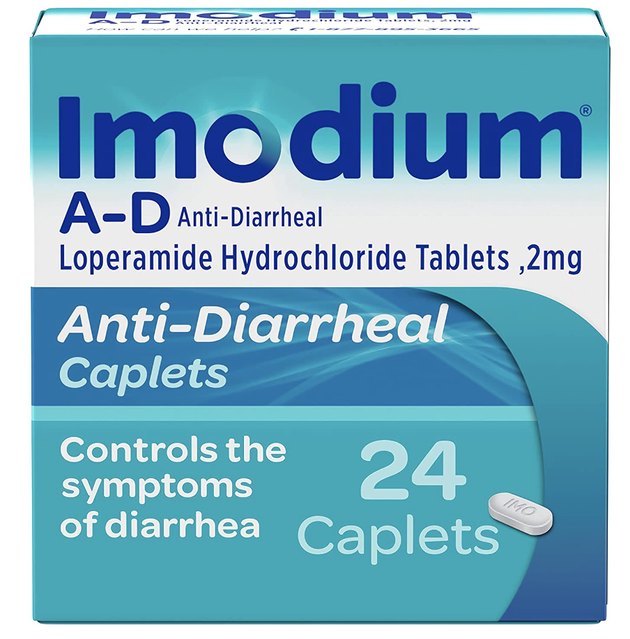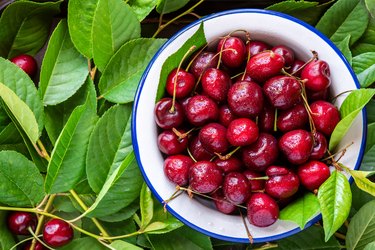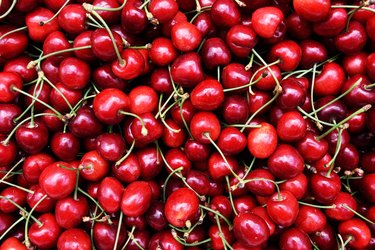
Like most fruits and vegetables, cherries can be a nutritious addition to your diet. But there can also be a less pleasant side to this delicious fruit: For some, cherries can cause gas, bloating, stomach pain and diarrhea, especially for those with underlying digestive conditions. The same is true for tart cherry juice, wild cherries and other cherry products.
Here, learn more about how this tasty summer fruit affects your digestion and how to actually enjoy eating them without irritating your GI tract.
Video of the Day
Video of the Day
Tip
Cherries are one of many foods that can cause gas and bloating. If you regularly experience digestive distress after eating them (or any food) talk to your doctor — they can help determine if you have an intolerance to the fruit or if another condition is at play.
Why Do Cherries Cause Digestion Problems?
It's important to understand why cherries can be the bad guy when it comes to your digestive system.
Cherries are high in fructose as well as sorbitol, according to Food Intolerance Diagnostics, so they're considered a FODMAP, which stands for fermentable oligosaccharides, disaccharides, monosaccharides and polyols.
FODMAPs are a specific kind of carbohydrate, per Harvard Health Publishing. Dairy, beans, certain fruits and veggies and some grains are on the list too, along with honey and other sweeteners.
The small intestine doesn't absorb FODMAPs very well. So, if you have irritable bowel syndrome (IBS) or another digestive condition and you eat cherries, you may pay for it later with gas, bloating, stomach pain and diarrhea.
Here's what you need to know about why cherries give you gas and other digestive issues:
1. Cherries and Gas
Cherries and other FODMAPs are quickly fermented by microflora (gut bacteria) living in the colon, which produces gas, per Food Intolerance Diagnostics — and gas equals flatulence and burping.
Other fruits that can cause gas are typically ones high in fructose. These can include the following, per Johns Hopkins Medicine:
- Apples
- Pears
- Mangoes
- Grapes
- Raisins
- Blueberries
Some other foods that can cause gas include cruciferous vegetables, high-fructose corn syrup and artificial sweeteners, per the International Foundation for Gastrointestinal Disorders.
Gas from cherries can happen to anyone, but people who have IBS might have more bacteria in the small intestine, which would produce more gas.
2. Cherries and Bloating
Sorry to say, but gas is just the beginning — cherries can also make you bloated. The sugar in cherries can draw water into your digestive tract, causing bloating, says Ray Scott Daugherty, Jr., MD, a colon and rectal surgeon at Baton Rouge General.
When this happens, it also affects how the muscles in the bowel wall contract, and sometimes constipation occurs — which leads to yet more belly bloat.
3. Cherries and Stomachache
Cherries do cause gas and bloating, which can in turn lead to stomach pain and discomfort, Dr. Daugherty says.
And the discomfort associated with cherries and other FODMAP foods can actually be excruciating for those with IBS, according to the International Foundation for Gastrointestinal Disorders. People have described their stomach aches as feeling like cramping, stabbing and sharp.
4. Cherries and Diarrhea
According to Harvard Health Publishing, sugar, namely fructose, is a big offender when it comes to diarrhea. Sugars stimulate the GI tract to put out water and electrolytes, which loosen bowel movements.
About 75 percent of people who eat more than 40 to 80 grams of fructose daily will get diarrhea, per Harvard Health Publishing. For reference, a cup of cherries (sans pits) has just over 8 grams of fructose, per the USDA.
How Many Cherries Should You Eat a Day?
A typical serving size of cherries is about 5 ounces, or 21 cherries, per the USDA, which has about 90 calories, 3 grams of fiber and a decent amount of potassium and vitamin C. Eating more than that can potentially cause side effects like digestive upset.
How to Prevent Digestion Problems From Cherries
One way to avoid all of these problems is to stop eating cherries, but that's a real bummer. So LIVESTRONG.com asked Ashley Kravitz, RD, founder of Nutrition Specialists of New Jersey, for suggestions on how to enjoy cherries and avoid digestion problems.
1. Eat in Moderation
If you love fruit, you're probably wondering how many cherries you can eat in a day.
"An appropriate serving size would be a half cup, although IBS is very individualized — some people are able to tolerate more foods than others," Kravitz says. If you have IBS, make sure you don't eat too many cherries by first trying a smaller portion (say, a quarter cup) to see how you feel.
2. Don’t Eat Them on an Empty Stomach
Too much fructose at once can mess with your digestion. Instead, try eating cherries with other foods that have low or no fructose, like lean meats, cheddar cheese, oats, eggs or nuts and seeds.
3. Avoid Other Triggers
What's tolerated well by one person may not be tolerated by another. But if you're sensitive to FODMAPs, you might want to avoid other foods with these carbs, per Johns Hopkins Medicine, including:
- Some other fruits, like apples, pears and peaches
- Some vegetables, like artichokes, asparagus, onions and garlic
- Beans and lentils
- Dairy products, including cow's milk, yogurt and ice cream
- Wheat-based foods, such as bread, crackers and cereal
Tip
To know for sure if cherries are causing your digestive symptoms, you can try cutting them out of your diet completely for a few weeks and then slowly re-introducing them. "If you don't experience any symptoms when you introduce the food back into your diet, you know it's not a trigger food for you," Kravitz says.
4. Chew Slowly
The more your food is broken down, the easier it is to digest, Kravitz says.
Of course, if none of these suggestions work and you're sure that cherries are making you gassy or leading to bloating, stomach pain or other digestion problems, you really may need to cut them out completely.
But before you make any decision regarding what's on and what's off your menu, Dr. Daugherty suggests talking to your doctor. That's because these symptoms can be caused by other conditions, so you'll want to make sure cherries are the culprit and not something else.
Tip
Chewing slowly can also help prevent you from accidentally chewing or swallowing the cherry pit, which can be dangerous, per the Missouri Poison Center.
How to Treat Digestive Upset From Cherries
If you've eaten cherries and are now experiencing gas and bloating, there are a number of things you can do to get relief. The first would be to try gentle movement (think: walking, stretching) and drinking plenty of water. Both of these things can help with bloat.
Next, you can take an anti-gas medication like Gas-X or a anti-diarrheal like Imodium, depending on your symptoms.
Lastly, if you're experiencing abdominal cramping and pain from these symptoms, you can use a heating pad on your stomach for relief.
The Bottom Line: Are Cherries Good for You?
Think of cherries as being good for you — so long as you don't experience digestive issues when you eat them. If you follow the tips above, you can experience the benefits of cherries like increased antioxidants, vitamins and minerals. For instance, cherries are rich in vitamin C and also high in fiber.
Diarrhea, gas and bloating could be due to a condition like irritable bowel syndrome (IBS). In order to determine this, try to keep a list of foods that cause gas and bloating and bring it to your doctor. From there, they can help you determine your triggers and develop a diet plan that's right for you.
FAQ
1. How Many Cherries Are Too Many?
One serving of cherries is about 5 ounces, or 21 cherries (per the USDA). Eating more than that ups your risk for experiencing side effects like digestive upset (bloating, gas and diarrhea) from the high fiber and sugar content.
If you have an underlying condition like IBS, you may want to eat even less than 5 ounces per day, depending on your individual tolerance.
2. What Are the Side Effects of Eating Cherries?
Other side effects of eating too many cherries include a blood sugar spike, an allergic reaction or food poisoning (if the cherries are bad).
If you notice a pattern of side effects after you eat cherries, see your doctor, who can refer you to a gastroenterologist or allergist, depending on your symptoms.
3. When Should You Not Eat Cherries?
If you're already experiencing digestive upset, you may not want to eat cherries, as they can exacerbate your symptoms. And if you're allergic to fruits in the same family (including pitted fruits like peaches, pears and apricots), you may want to steer clear of cherries, too, per the American Academy of Allergy, Asthma & Immunology (AAAAI).
Of course, if you have a known cherry allergy, you should avoid eating them, too.
4. What Fruits Cause the Most Gas?
While cherries can make you gassy, they're not the only fruits that can cause GI distress. Apples, pears and watermelon are all high in fructose, which can lead to gas, diarrhea, bloating and other stomach pain, per the Mayo Clinic. Strawberries can also cause gas for some.
- Food Intolerance Diagnostics: "Sorbitol Content of Food"
- Harvard Health Publishing: "Try a FODMAPs Diet to Manage Irritable Bowel Syndrome"
- International Foundation for Gastrointestinal Disorders: "Pain in IBS"
- Harvard Health Publishing: "Is Something in Your Diet Causing Diarrhea?"
- Johns Hopkins Medicine: "FODMAP Diet: What You Need to Know"
- USDA: "Cherries, sweet, raw"
- University of Rochester Medical Center: "Nutrition Facts — Cherries"
- USDA: "Cherries, Sweet, Dark Red, Raw"
- AAAAI: "Anaphylactic reactions to cherries, strawberries, and grapes"
- Missouri Poison Center: "https://missouripoisoncenter.org/is-this-a-poison/cherry-pits/"
- Johns Hopkins Medicine: "Do Certain Fruits Cause Gas?"
- International Foundation for Gastrointestinal Disorders: "Foods Likely to Cause Gas"
- Mayo Clinic: "Fructose intolerance: Which foods to avoid?"
Is this an emergency? If you are experiencing serious medical symptoms, please see the National Library of Medicine’s list of signs you need emergency medical attention or call 911.





